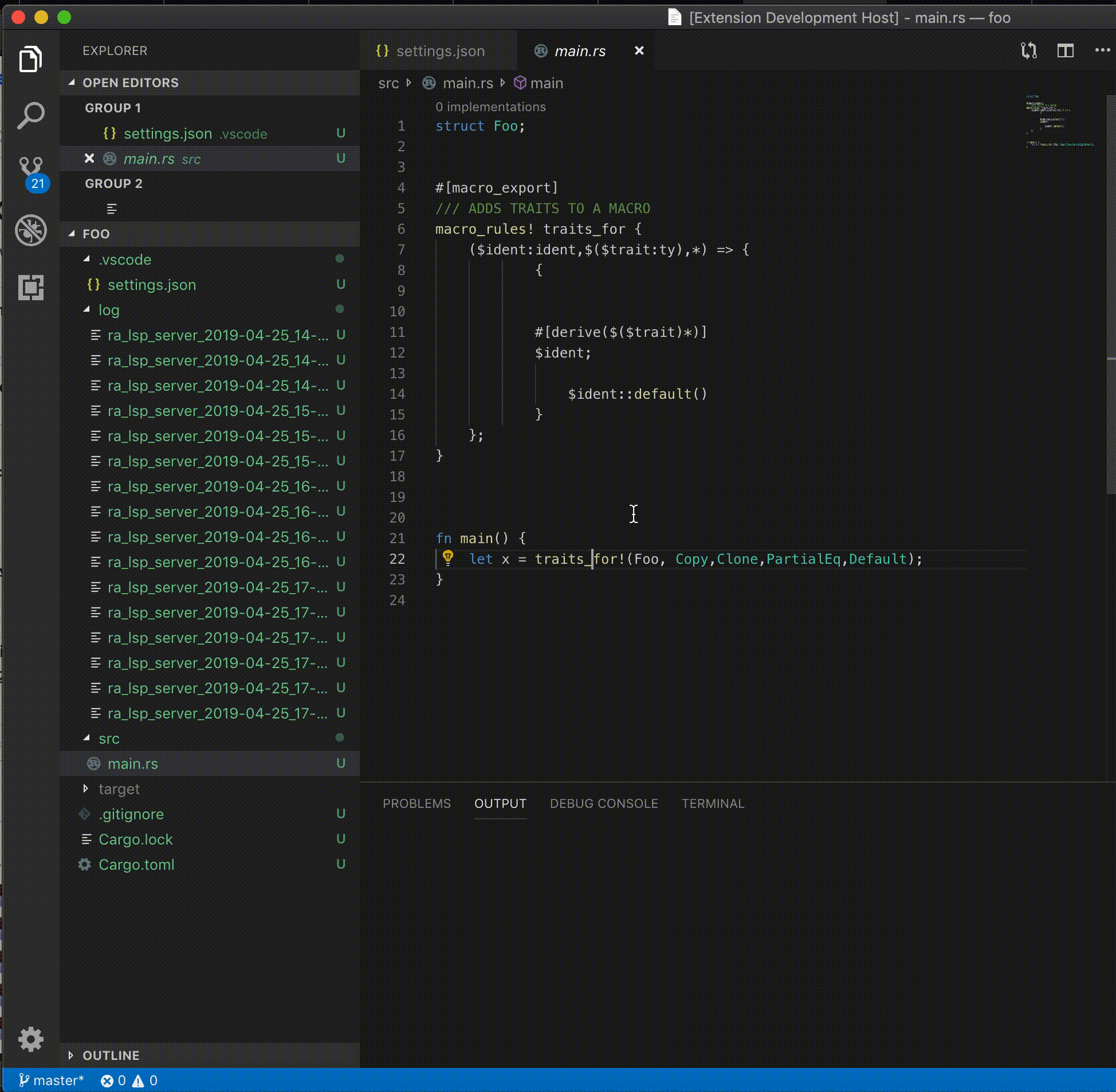Very simple approach: For each identifier, set the hash of the range
where it's defined as its 'id' and use it in the VSCode extension to
generate unique colors.
Thus, the generated colors are per-file. They are also quite fragile,
and I'm not entirely sure why. Looks like we need to make sure the
same ranges aren't overwritten by a later request?
1208: [WIP] Goto for Macro's r=matklad a=Lapz
Adds goto definition for macros. Currently only works for macros in the current crate ~~otherwise it panics~~. Proper macro resolution needs to be added for it to resolve macros in other crates.
Todo
- [X] Allow goto from macro calls
- [X] Fix panics
- [x] Add tests

Co-authored-by: Lenard Pratt <l3np27@gmail.com>
1213: Make lexer produce only single character puncts r=matklad a=edwin0cheng
As discussed in Zulip, this PR change `lexer` to produce only single char punct.
* Remove producing `DOTDOTDOT, DOTDOTEQ, DOTDOT, COLONCOLON, EQEQ, FAT_ARROW, NEQ, THIN_ARROW` in lexer.
* Add required code in parser to make sure everythings works fine.
* Change some tests (Mainly because the `ast::token_tree` is different)
Note: i think the use of `COLON` in rust is too overloaded :)
Co-authored-by: Edwin Cheng <edwin0cheng@gmail.com>
E.g. in
```
let foo = 1u32;
if true {
<|>foo;
}
```
the hover shows `()`, the type of the whole if expression, instead of the more
sensible `u32`. The reason for this was that the search for an expression was
slightly left-biased: When on the edge between two tokens, it first looked at
all ancestors of the left token and then of the right token. Instead merge the
ancestors in ascending order, so that we get the smaller of the two possible
expressions.
1154: Initial support for lang items (and str completion) r=flodiebold a=marcogroppo
This PR adds partial support for lang items.
For now, the only supported lang items are the ones that target an impl block.
Lang items are now resolved during type inference - this means that `str` completion now works.
Fixes#1139.
(thanks Florian Diebold for the help!)
Co-authored-by: Marco Groppo <marco.groppo@gmail.com>
1138: Add L_DOLLAR and R_DOLLAR r=matklad a=edwin0cheng
As discussion in issue https://github.com/rust-analyzer/rust-analyzer/issues/1132 and PR #1125 , this PR add 2 `Syntax::Kind` : `L_DOLLAR` and `R_DOLLAR` for representing `Delimiter::None` in mbe and proc_marco. By design, It should not affect the final syntax tree, and will be discard in `TreeSink`.
My original idea is handling these 2 tokens case by case, but i found that they will appear in every place in the parser (imagine `tt` matcher). So this PR only handle it in `Parser::do_bump` and `Parser::start`, although It will not fix the `expr` matcher executing order problem in original idea.
Co-authored-by: Edwin Cheng <edwin0cheng@gmail.com>
1076: Const body inference r=flodiebold a=Lapz
This is the second part of #887. I've added type inference on const bodies and introduced the DefWithBody containing Function, Const and Static. I want to add tests but im unsure on how I would go about testing that completions work.
Co-authored-by: Lenard Pratt <l3np27@gmail.com>
1082: Async block in argument position r=matklad a=andreytkachenko
Fixes case when async block appears in argument position
Co-authored-by: Andrey Tkachenko <andreytkachenko64@gmail.com>
1081: Async closure syntax r=matklad a=robojumper
Fixes#1080.
Also fixes an error introduced by #1072 where something like `async move "foo"` in expression position would trigger the assertion in `block_expr`.
Co-authored-by: robojumper <robojumper@gmail.com>
These are now used when parsing type bounds. In addition parsing paths inside a
bound now does not recursively parse paths, rather they are treated as separate
bounds, separated by +.
1034: HIR diagnostics API r=matklad a=matklad
This PR introduces diagnostics API for HIR, so we can now start issuing errors and warnings! Here are requirements that this solution aims to fulfill:
* structured diagnostics: rather than immediately rendering error to string, we provide a well-typed blob of data with error-description. These data is used by IDE to provide fixes
* open set diagnostics: there's no single enum with all possible diagnostics, which hopefully should result in better modularity
The `Diagnostic` trait describes "a diagnostic", which can be downcast to a specific diagnostic kind. Diagnostics are expressed in terms of macro-expanded syntax tree: they store pointers to syntax nodes. Diagnostics are self-contained: you don't need any context, besides `db`, to fully understand the meaning of a diagnostic.
Because diagnostics are tied to the source, we can't store them in salsa. So subsystems like type-checking produce subsystem-local diagnostic (which is a closed `enum`), which is expressed in therms of subsystem IR. A separate step converts these proto-diagnostics into `Diagnostic`, by merging them with source-maps.
Note that this PR stresses type-system quite a bit: we now type-check every function in open files to compute errors!
Discussion on Zulip: https://rust-lang.zulipchat.com/#narrow/stream/185405-t-compiler.2Fwg-rls-2.2E0/topic/Diagnostics.20API
Co-authored-by: Aleksey Kladov <aleksey.kladov@gmail.com>